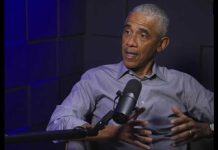
Why is the U.S. envoy siding with Syria, and what does this mean for Israel and the region?
At a Glance
- U.S. Special Envoy Thomas Barrack criticizes Israeli intervention in Syria.
- The U.S. has revoked major sanctions on Syria, aiming for a stable region.
- A U.S.-brokered ceasefire between Syria and Israel has faltered.
- Sectarian violence is threatening the peace process in Syria’s Sweida Province.
U.S. Envoy Condemns Israeli Intervention
On July 21, 2025, U.S. Special Envoy Thomas Barrack took a bold stance by criticizing Israeli military operations in Syria, labeling them as destabilizing for the region. His statements reflect a significant shift in U.S. foreign policy, aligning with Syria’s transitional government led by President Ahmed al-Sharaa. Barrack emphasized that there is “no Plan B” for Syria, reiterating that supporting the new government is the only viable path toward stabilization.
Israel, however, views its actions as necessary to counter Iranian influence and ensure national security. This difference in perspective between the U.S. and Israel highlights ongoing regional tensions and the complexities of international alliances. Barrack’s remarks have sparked debates over the role of foreign interventions and their impact on Syria’s delicate peace process.
Ceasefire Fails Amid Sectarian Violence
The U.S.-brokered ceasefire between Syria and Israel, announced on July 18, 2025, quickly crumbled under the weight of renewed sectarian violence, particularly in the Sweida Province. This area has become a hotspot for clashes involving Druze militias, Bedouin fighters, and government forces. The outbreak of violence has resulted in over 120 deaths and thousands displaced, deepening Syria’s humanitarian crisis.
The ceasefire’s failure underscores the fragility of Syria’s transitional government and the daunting task ahead in uniting a country ravaged by years of conflict. President Ahmed al-Sharaa’s government faces immense pressure to maintain stability and legitimacy amid internal opposition and external threats.
U.S. Policy Shift and Sanctions Revocation
The U.S. has made a decisive move by revoking many sanctions on Syria as of June 30, 2025. This policy shift aims to support Syria’s reconstruction and bolster the new government’s legitimacy. The easing of sanctions opens the door for economic revival, but it also raises questions about the accountability of actors with questionable human rights records.
International observers are cautiously optimistic about the potential for Syria’s recovery. However, the success of these efforts hinges on sustained peace and international investment. The lifting of sanctions is a gamble that stability can be achieved, one that critics argue must be paired with robust measures for reconciliation and protection of minority groups.
Regional Implications and Future Prospects
Syria’s situation remains precarious, with sectarian divisions threatening to derail the peace process. The transitional government’s success or failure will determine whether the country can move toward national reconciliation or slip back into protracted conflict. The ongoing Israeli interventions and Iranian influence in Syria further complicate the region’s stability.
For U.S. policy, the current administration’s approach reflects a willingness to engage with Syria’s new government, potentially reshaping alliances and rivalries in the Middle East. However, the durability of the peace process and the long-term commitment of international actors remain uncertain. The stakes are high, and the outcomes will have far-reaching effects on regional security and international relations.



